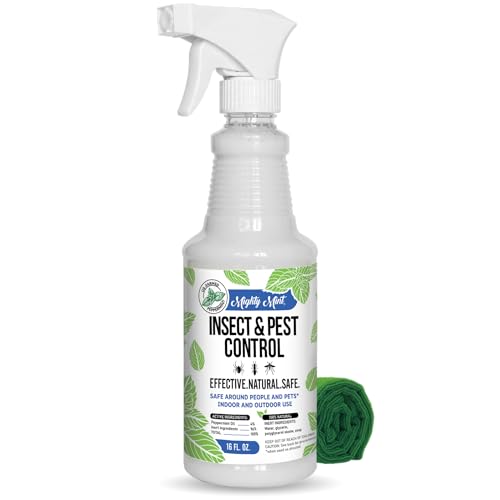Whether you have a sunflower garden for harvesting or pure personal enjoyment, there's no denying the beauty these plants can add to your garden.
However, it can be hard to enjoy these plants when you're distracted by torn leaves, holes, and cut stems.
Pests can wreak havoc on your sunflowers, and whether they are causing detrimental damage or simply creating unsightly wounds on your leaves, getting rid of them should become your top priority.
We have researched the causes and cures for this concerning issue.
If you notice your sunflower leaves are taking a beating, these are some of the insects and wildlife that can be causing the damage:
- Cutworms
- Deer
- Rabbits
- Finches
- Aphids
- Weevils
- Ants
It seems like a lot can be doing damage to your sunflowers. Still, thankfully most of these can be fixed fairly easily.
To learn more about these pests and how to manage the problem, keep reading! We've researched and compiled the best and easiest ways to get your sunflower garden back from those ravaging your leaves.
![Close up of Sunflower Garden. - What Is Eating My Sunflower Leaves? [And How To Stop Them]](https://gardentabs.com/wp-content/uploads/2021/09/Close-up-of-Sunflower-Garden.-What-Is-Eating-My-Sunflower-Leaves-And-How-To-Stop-Them.png)
What Is Eating Your Sunflower Leaves
Cutworms
Most commonly, cutworms are nighttime leaf eaters that are hard to identify because they hide in the soil during the day.
Cutworms are the larvae of brown moths, and they will chew through the leaves and stems of your sunflower plants.
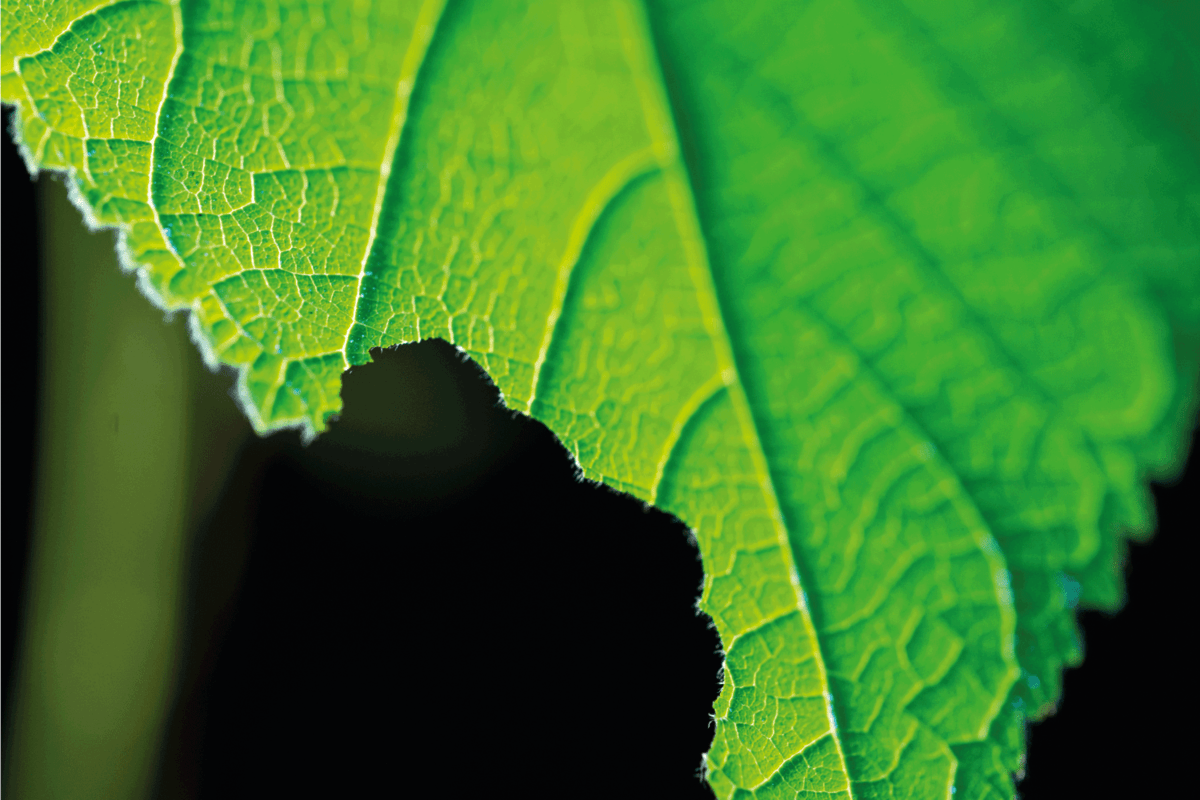
Management
Since these pests are hard to catch as they blend in with the soil during the day and eat at night, the best way to get rid of them is by making the soil dangerous for them.
For this, you can use Diatomaceous Earth (DE).
This fine powder is made from dried, single-cell algae found near water beds and has many benefits, from water filtration to feed enhancement. Food-grade options can even be mixed in the food of household pets to deter fleas.
Although DE is beneficial to some, it is deadly to others. When sprinkled around the soil of your garden bed, this powder will attach to pests and dry out their outer shell, killing them.
As cutworms live in the soil, this should eliminate your issue if you keep up with DE applications after heavy rainfalls.
Deer

Deer love sunflowers. Thankfully, there are safe ways to keep these guys out of your sunflowers that won't harm them or your plants.
A long-lasting solution to keeping deer from your sunflowers is to build a fence; however, this can be unappealing.
Deer will jump most fences unless they are tall enough to keep them out, and that can make having a sunflower garden of bright, beautiful plant life hard to see.
Read more: How To Effectively Use Liquid Fence Deer & Rabbit Repellent
Adding unpleasant smells around your sunflowers is a way to keep deer away without having to block the view of your gorgeous sunflowers.
This means strong and sometimes putrid smells, like eggs, chili peppers, and even dead fish heads (granted, these will become rich fertilizer as they break down).
If you don't mind adding to your garden, you can also create a barrier of strong-smelling marigolds or lavender plants or deterring plants with thorns to keep deer at bay.
Read more: Why Deer Don’t Eat Lavender [And How To Protect Your Other Plants]
Rabbits
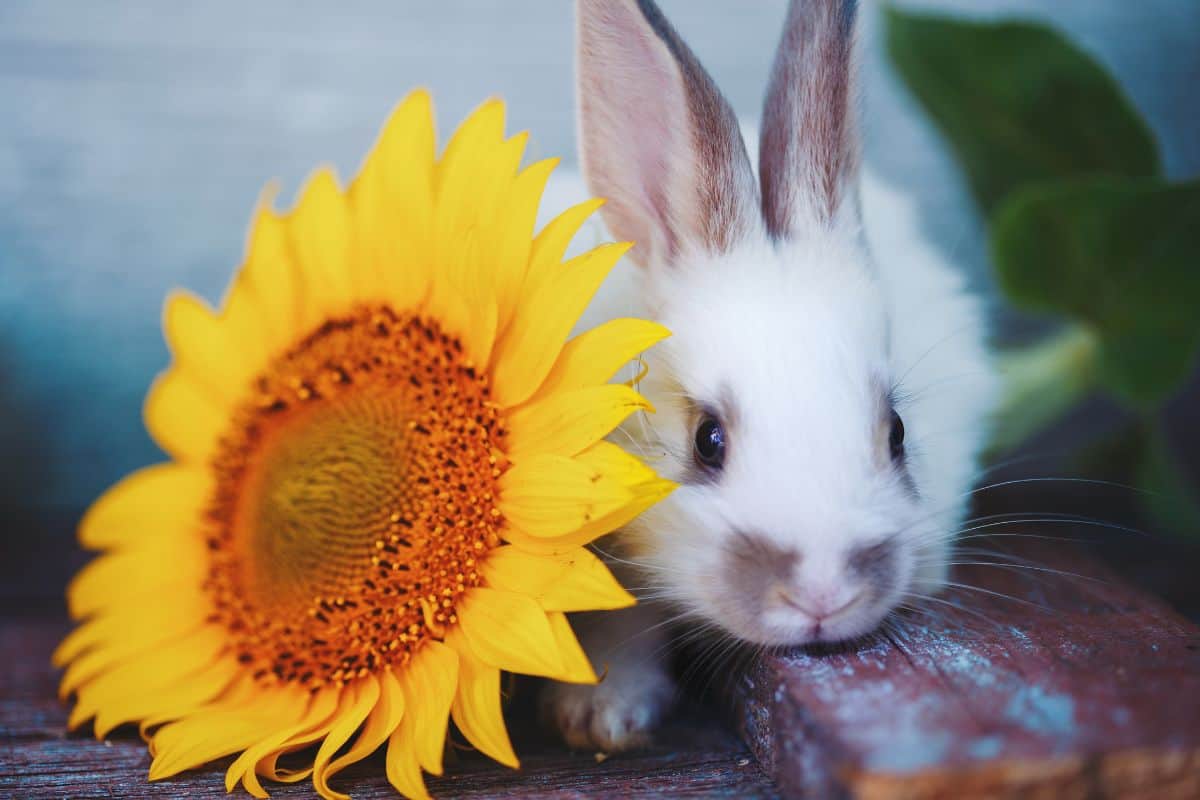
Rabbits love sunflowers, vegetables, and many other garden plants, making them a pest to most gardeners.
As cute as these little animals are, they can wreak havoc on your sunflowers. Thankfully, there are ways to keep them at bay without harming them.
Deterrents
There are certain smells you can sprinkle or spray around your garden that will help keep rabbits away.
Chili powder can be sprinkled around the bed of your garden. This smell will drive rabbits away, and if one does happen to get a taste, they likely won't come back around that smell again.
Sprinkling blood meal, an inert powder made from blood, will keep rabbits at bay and is a great garden fertilizer.
With all of these options, it's important to remember that rain and plant watering will dilute or eliminate these deterrents, so reapplying is a must to keep these garden pests away for good.
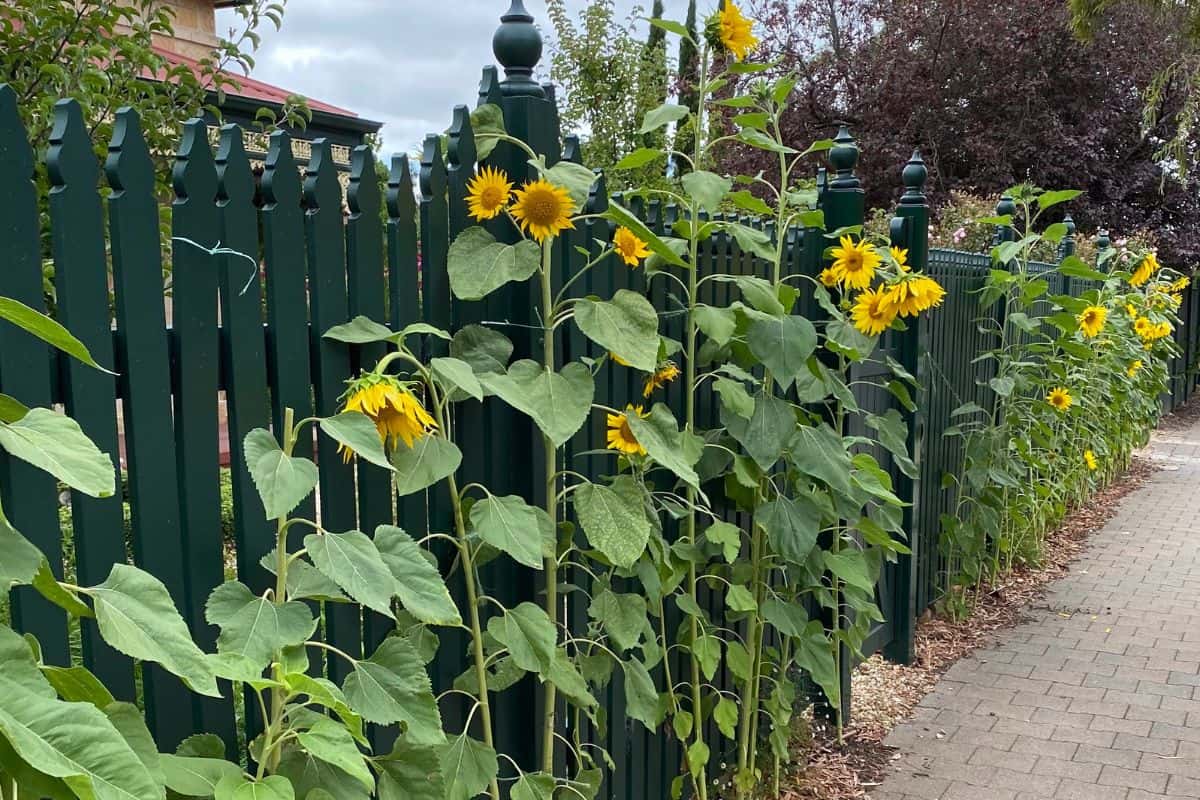
A more permanent way to keep rabbits from your garden is by building a small border fence. This fence needs to be 2-3 feet high and can be as simple as attaching chicken wire to wooden garden stakes.
Although this is the most efficient way to keep rabbits out of your garden, be sure to choose a chicken wire or other fencing material that is small enough to not only keep rabbits from pushing through gaps but also too small for a rabbit to get caught in.
For a cute dose of rabbits, you should check out this story: Bunnies In Bloom: When Mother Nature Hops Into Your Garden Plans
Birds
If you have birds chomping at your sunflower leaves, chances are they are finches. These tiny birds love large, leafy plants and will devour sunflower leaves.
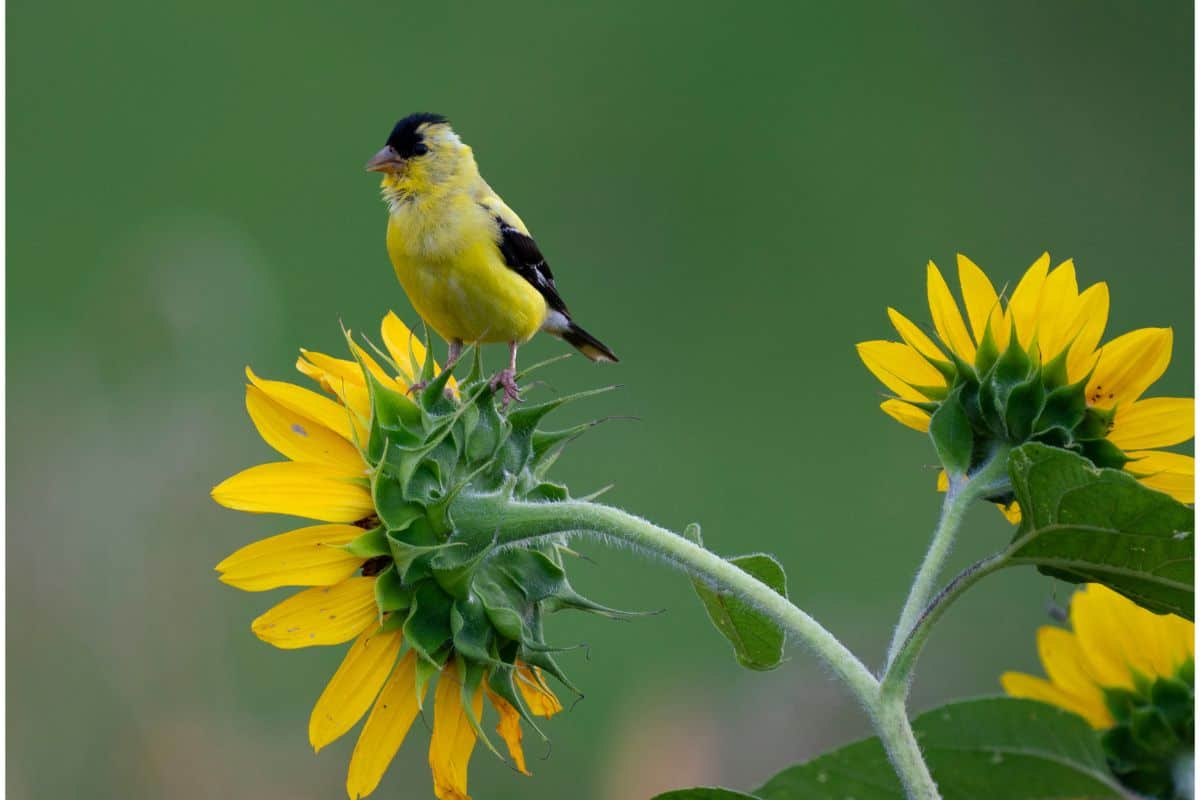
Birds are harder to keep out of gardens, but you can create movement and light to scare them off, at least some of the time.
Shiny ribbons or mirrored wind chimes tied to plants and hung around the garden will create light and move in the wind to help keep some of these birds out of your garden.
Alternatively, if you just want to protect your sunflowers, you can plant other appealing plants, like kale, around the garden to give your sunflower leaves a higher chance of surviving these leaf-eating finches.
Aphids & Weevils
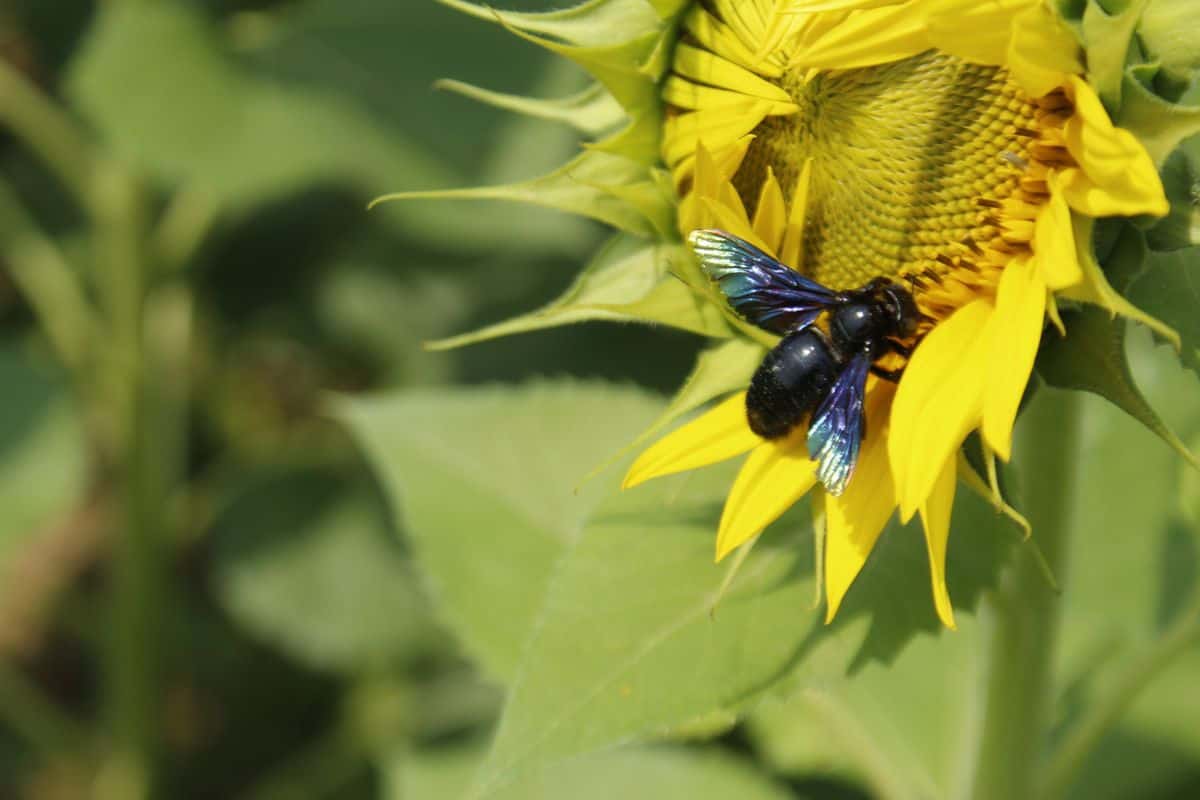
If you see black bugs on your sunflowers, you are most likely seeing one of two bugs—aphids or sunflower weevils.
Aphids
Aphids are tiny black bugs that group on the underside of plant leaves. These insects have specialized mouths made specifically for biting and sucking the fluids from leaves.
Aphids interfere with transporting nutrients through the plant, so they have to be managed to protect your sunflowers.
Management
To safely control aphids, and other pests, without risking the elimination of healthy insects, you can spray your sunflowers with neem oil.
This natural insecticide not only destroys pests but can also protect your plants from fungal diseases.
Weevils
Sunflower weevils, or black stem weevils, are small black bugs with protruding heads and pinchers. These bugs cause damage to sunflowers by weakening the stems or completely detaching the head of the sunflower.
Although some forms of weevils can be harmless, they should be removed if they are damaging your plants.
Management
To keep away weevils and other small ground pests without chemicals, you can dust the bed of your garden with Diatomaceous Earth. Neem oil will also work for weevils.
Ants
Ants are attracted to sunflowers largely because of the nectar they produce. If ants become too much of an issue, various pest control methods can be used.
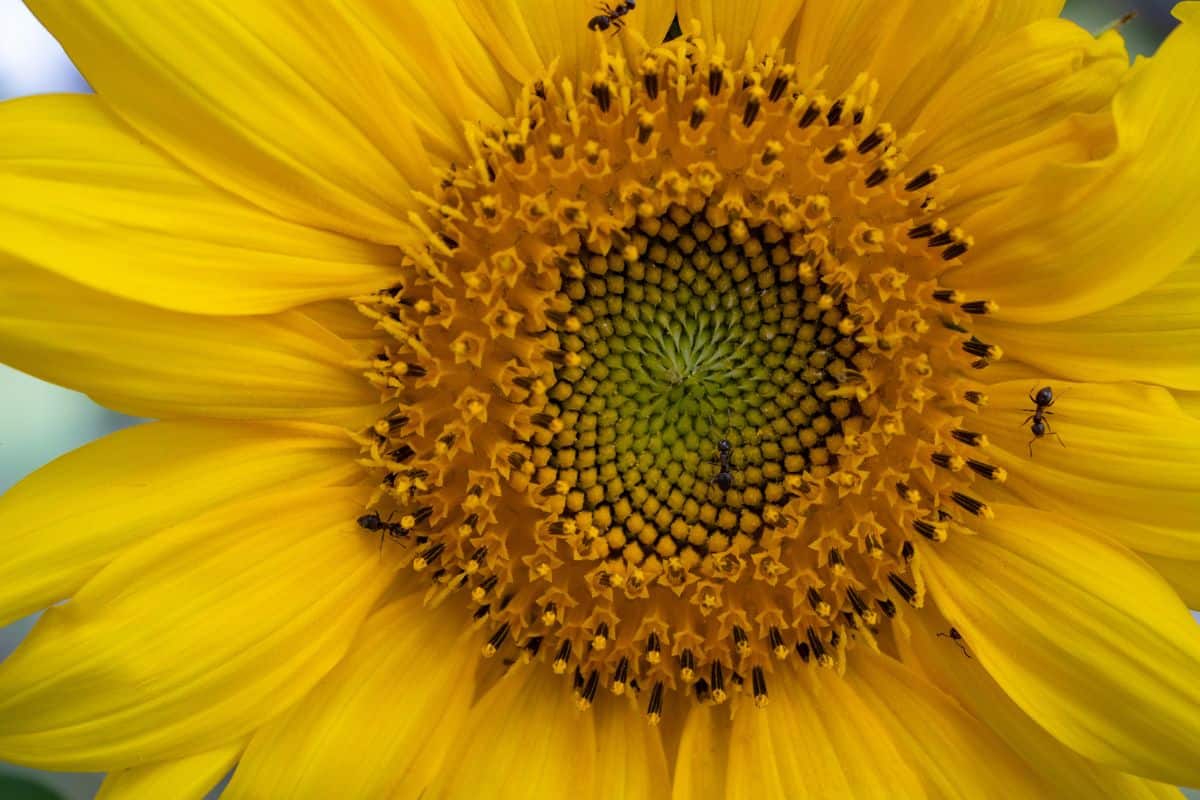
Trap
You can use Vaseline and paper to create a trap around your sunflower to catch the ants infesting your plants.
Cut a ring of paper that fits around the base of the plant, making it at least six inches wide.
Then, spread Vaseline over the upturned side. Ants will get trapped in the Vaseline when they attempt to travel to and from your sunflowers to their nests.
Deterrents
For a humane way to rid your plants of ants, ants hate certain smells enough to keep them away. Smells like cinnamon and mint at the base of your plants will work as a deterrent for ants.
When using cinnamon, you can sprinkle the spice on the ground around the base of your sunflowers.
Read more about cinnamon in garden care: Pro-Level Gardening Tip: Use Cinnamon As A Natural Fungicide
For mint, you can plant peppermint plants around the flowers to create a constant barrier that ants will avoid.
If you don't want to add more plants to your garden, you can use peppermint oil or sprinkle mint leaves on the ground around your sunflowers.
Ant Killing Food
There are "food" creations that ants will eat that will kill them. Mixing sugar and cornmeal and sprinkling it around the soil of your sunflowers will eliminate the ants.
Citrus oil, either ingested or touched by ants, will eliminate them as well. This is a natural option that will cause no harm to your plants.
How do you treat sunflower pests?
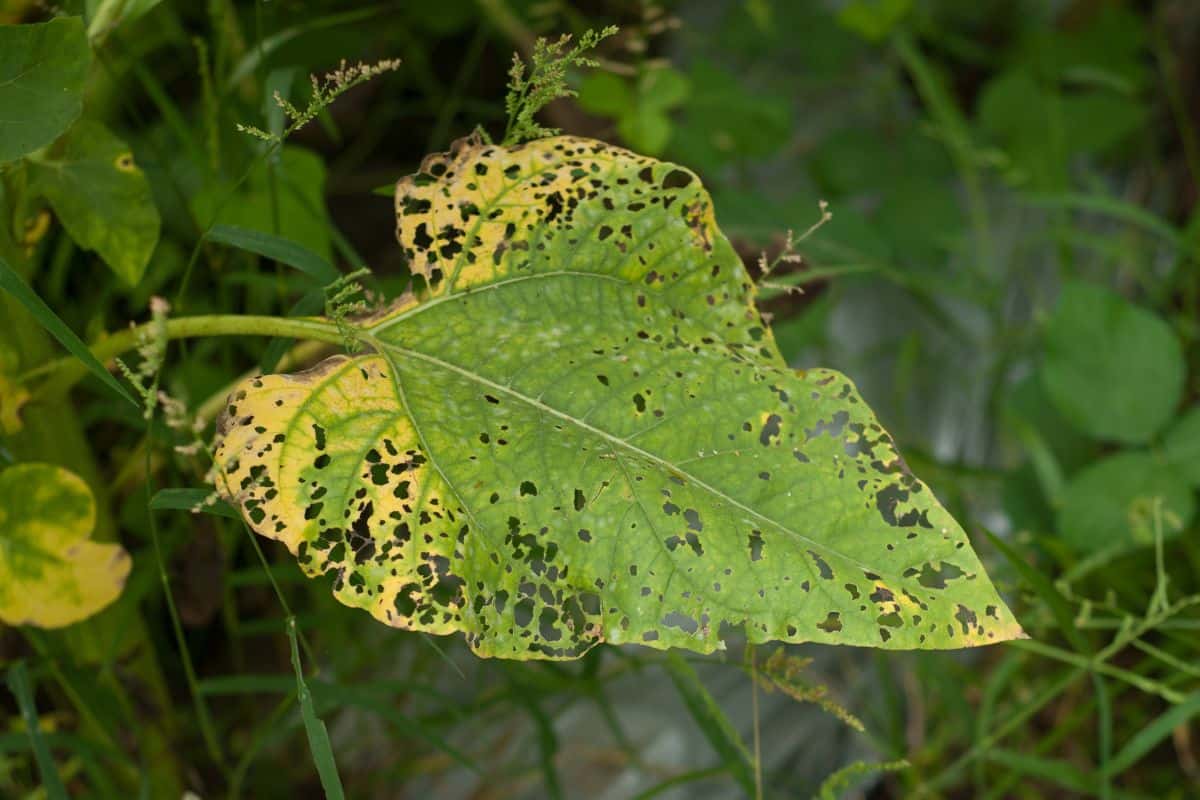
When you have pests, whether the ones mentioned above or otherwise, you can take precautions with garden-safe insecticides and homemade insecticides.
You can mix 1 1/2 teaspoons of dish soap per quart of water and spray this on your plants for a homemade option. This will work to get rid of some pests and keep them away.
For a fuller coverage pest spray, you can use any of these pest sprays that are safe for your garden and sunflowers.
In Closing
Sunflowers are majestic and beautiful additions to home gardens, open fields, and profitable harvests. But pests can put a damper on their growth and even kill them.
Taking care of unwanted pests and wildlife is detrimental to having a healthy garden, and thankfully most are easy to deter from your sunflowers.
Looking for information on growing large sunflowers? Check out this beginners guide:
How To Grow Mammoth Sunflowers [Garden Guide For Beginners]
If you're having aphid issues with other plants, head over to this post to see how to treat your roses:






